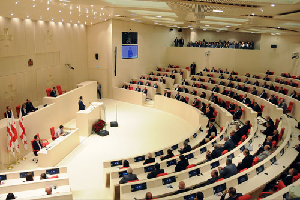Latest Round Of Geneva Talks Yields Little Progress In Georgia-Russia Relations
by Eka Janashia (04/03/2013 issue of the CACI Analyst)
The most recent round of the Geneva Talks, held on March 27 in Switzerland, did not yield any concrete results but confirmed the continuity of negotiations under this format. The inability to reach a non-use-of-force agreement continues to be one of the most challenging issues preventing the participants, Georgia, Russia, Abkhazia and South Ossetia, to overcome the deadlock in the discussions.
The International Dimension Of Georgia's Domestic Infighting
by Niklas Nilsson (03/20/2013 issue of the CACI Analyst)
Georgia’s cohabitation process following the October 2012 elections seems increasingly dysfunctional, as the political parties of the President and Prime Minister have failed to cooperate on most issues. While Georgia’s general foreign policy direction remains a rare topic of consensus, the mutual distrust in domestic politics is increasingly also visible in Georgia’s foreign policy, as President Saakashvili and Prime Minister Ivanishvili and their associates compete for international attention to their respective narratives of developments in Georgia. While this tendency can be considered a logical continuation of the election campaign of last year, it also tests the patience of Georgia’s international partners in a situation where Georgia badly needs to reassert confidence in its political process.

Georgia Moves Closer To Political Crisis
by Eka Janashia (03/06/2013 issue of the CACI Analyst)
A March 4 meeting between the Georgian President and Prime Minister did not yield any tangible results. The two leaders aimed to reconcile the Georgian Dream (GD) coalition’s and the United National Movement’s (UNM) party positions over the constitutional amendments thwarted on February 20 due to divergent views on the extent of amnesty for former officials.
Georgia's President Alleges Planned Power Shift In Azerbaijan
by Mina Muradova (03/06/2013 issue of the CACI Analyst)
A recent statement of Georgia’s President after his visit to Baku, alleging that Russia was going to destabilize the situation in Azerbaijan as it did in his country before last year’s elections, has caused concerns in both countries. The statement appears in a situation where Baku reportedly experiences tensions with Moscow, but Tbilisi is seeking to normalize its relations with Russia.






